- Home
- Harlan Ellison
Slippage: Previously Uncollected, Precariously Poised Stories Page 10
Slippage: Previously Uncollected, Precariously Poised Stories Read online
Page 10
"They? What'they'? Isn't this Hittite?"
Loder shook his head. "It's been reused. It was made for someone else. Look at the lid. That's the name of the king who was buried in this box. It's an early use of the Phoenician alphabet. I'd date this no earlier than 1000 B.C.E. The glyph is at least three thousand years older...that's if we believe the tests the Geographic paid out a fortune to have run on it." He walked around the sarcophagus, Bobby following in awe.
"These scenes carved on the sides and ends. They're typical of Canaanite and Phoenician art, with a mixture of Egyptian and Asiatic motifs. No, this box came later than what was buried in it."
"So what's in it?" Bobby said, in a hushed tone.
Loder walked to the wall and slid down. He pulled out his pipe and loaded it. "What turned the Sahara from a fertile land into a rocky desert? What caused the collapse of the great empires in the twelfth century B.C.E.? Desolation, unexplained, for Greece in the seventh century. Why?"
"Stop it, Dennis. You're doing a job on me, so knock it off! What's in the box?"
He lit the pipe and drew deeply. The rich smell of black cavendish, the first alien odor to find its way into this tomb, filled the musty chamber. "It's 1200 B.C.E. In the heart of the Anatolian plateau the dynasty of Hittite kings, treated on equal terms with the Pharaohs of Egypt, rulers of all they surveyed, part of the greatest empire the world has ever known, abruptly comes to an end. Their capital city is abandoned. Why?
"This coffin dates to that period, if I'm worth the faith you had in bringing me along. I know pretty much what I'm talking about; but there are experts; they might..."
"What the fuck is in the goddam box, Dennis!"
"I don't know."
"So what, then? We're both scared out of our minds, this damned rock acts like it wants to jump up and open the casket itself, we've come all this way and if we ever get back it'll be a miracle. So what's it gonna be? Do we do the thing or do we get the hell out of here. Or what?"
Loder stood and walked to the sarcophagus. Bobby Shafka was a step behind him. He watched as Dennis placed the agonizingly bright sigil at the line where lid and box met. Light flooded from the glyph, spread like lava in that thin line, circumnavigated the casket, and met in brilliance where it had started.
As they stepped back, the lid rose as if lifted from within.
At the same moment they heard the beating of wings.
Down the length of the entrance passage, they heard the beating of wings.
Bobby pulled a pistol from his inside jacket pocket. Dennis had not known he was carrying a weapon.
He faced the mouth of the chamber passage, and he said softly, "I'll kill myself before I let them take my soul!"
Then, in a moment, as the chamber filled, there was less time left of life than they could ever have imagined.
Dennis screamed at Bobby. "Soul? Soul? Where do you get that!? They don't want your soul... they 're just hungry!"
Then, in an instant, despite the roar of Bobby's gun, there was no time left at all.
And they were table scraps of the great, long banquet to come; at the groaning board laid only for the one-eyed child. (It is said.)
The Pale Silver Dollar of The Moon Pays Its Way and Makes Change
Version 1
1934
Bruno Hauptmann was arrested for the kidnapping and murder of the Lindbergh baby. No one had come to my birthday party the year before, not one kid of all the kids from my grade school who had received a personal invitation done in multiple colors with the sixteen crayons in my Crayola box. This year, I knew there wouldn't even be a party; it was too embarrassing.
So after school I never went home. I ran away. I crossed Mentor Avenue against the wishes of my mother and father, and I trudged down through the high weeds and sumac woods of the empty lots behind the Colony Lumber Company, and I sat down on the edge of the bank that surrounded the dirty green water of the nameless pond, and I tossed stones into the thick dirty water, and I watched the skeeter bugs skimming the surface across the circular ripples, and I tried to catch one of the nasty fish that lived in the pond, using a string and a piece of bread and a stick I broke off a bush.
When it got dark, I still sat there. For hours after it got dark. Until it got so cold that I finally trudged back out of that minor wilderness, and re-crossed Mentor Avenue, and went home. My mother and father were beside themselves. They had called out the police. I came into the house, muddy and cold and still crying. And I saw they had left most of the cake with the candles unlit still on the table, along with the birthday presents they'd bought me; and if there had been any kids there, they were now gone. But I still knew my mom and dad would have had to call parents to get the kids to come. Mao Tse-tung began his impossible 6000-mile march of retreat with his 90,000-man Red Army from Kiangsi to the Shensi province with Chiang Kai-shek nipping at his heels.
1947
Chairman J. Parnell Thomas called his first witness in the preliminary hearings to establish loyalty or seditious behavior on the part of Communists or Fellow Travelers in Hollywood. Just outside King of Prussia, Pennsylvania, I accepted a ride from a man in a Hudson touring car. I'd been hitching my way east and hadn't eaten in a day and a half. At a farmhouse in the outlying north of Smoketown, near Lancaster, I had gotten a dinner from a nice woman and her family by knocking on their door and telling them I could repair the old washing machine and mangle rusting away in the side yard.
She had looked at me with skepticism, but I said if I coudn't fix it, it wouldn't cost her nothing. But if I got it working, could she spare something to eat? So she asked her husband, who was working in the barn, and he came out just beyond the big barn doors, and he shaded his eyes with his hand to look at me with the setting sun behind me, and he told her what've we got to lose, so she let me go ahead.
I didn't know any more about fixing a washing machine or a mangle than the man in the moon, but I'd done this kind of thing about twenty times before, and once in a while I'd spot something simple that I could twist back into shape or hook up, and it'd work, and I'd eat. So I labored over them both, the washing machine and the mangle, and I sweated for a couple of hours, but couldn't get either of them going. And it was dark, then, and the lady came out and asked if I'd done any good, and I said no ma'am; and I started putting my windbreaker back on, so I could take off down the road again; and she said, well, c'mon in, then, and have a bite with us, which was very kind of her because she probably knew I was faking it all along; but I'd sweated for a couple of hours, so she fed me.
And that had been a day and a half ago. I got into the Hudson, and the man put it in gear, and he put his hand on my lap and asked me how old I was, and I yanked down the door handle as hard as I could, and I grabbed my stuff wrapped up in a shirt, and I jumped out of the car before he could get it into second, and I ran away into the woods. Great Britain proposed the partition of Palestine, and there were tremendous protests from Arabs and Jews.
1959
Fidel Castro swept down out of the Sierra Maestra and drove Batista from Cuba with the invasion of Havana. I was serving with the U.S. Army in the capacity of reporter for the Ft. Knox newspaper, Inside the Turret. I was living in a trailer in Elizabethtown, Kentucky because I was married, even though they didn't know I was separated. I hated the barracks and had taken the trailer under what they called separate maintenance. But she was back in New York, and we'd probably never see each other again, which was fine by me.
One night I went to a record store in Elizabethtown to buy a jazz album, and I met up with a bunch of teen-aged kids from the high school who knew me because they'd seen me around; and they asked me if I wanted to come to a sock hop that night.
So I went to the high school and paid a dollar to come into the dance, and I hung around and had some punch, but nothing much was happening. And then I saw a girl, maybe fourteen or fifteen, with a leg brace on. I think it was polio. And she was sitting watching everyone dance, but no one asked her. So
I went over and smiled and asked her if she'd like to dance, and at first she was very shy, but after I asked a couple more times she said okay, and we got up and I was careful not to be too tricky with the steps, and we had a nice dance. It was Danny and the Juniors doing "At the Hop." She thanked me when I took her back to her seat, and during the evening we danced again half a dozen times. The Nobel Prize for Medicine and Physiology was awarded to Ochoa and Romberg for their synthesis of DNA and RNA.
1962
Adolf Eichmann was hanged in Jerusalem, and the United States Supreme Court ruled against official prayer in public schools. How I met Carl Sandburg was this: Bill was married to Lelia, and I'd met them at somebody's party, and I was staying in a small apartment down on Wilshire near Beverly Glen, and they invited me to visit their house way up in the Glen, at the end of a small street called Beverly Glen Place, and it was so beautiful up there, all private and quiet, that I rented a funny little treehouse up a steep driveway called Bushrod Lane, and that was how I came to be living just about next door (and, above) Bill and Lelia's when Bill was hired for second unit work on The Greatest Story Ever Told. Or maybe he was an assistant director.
One Sunday Bill called and said there was a party going on at George Stevens's mansion up in the Hollywood Hills, and did I want to come for a while? I .asked if it was okay, and he said, yes, it was fine, Mr. Stevens had told him to ask anyone he thought would be interesting. So I took the directions to Mr. Stevens's house, and I dressed up in the best suit I had, which was too big on me because I hadn't been working and I'd lost a lot of weight, and I had to pin the pants tight across my waist, and I was ashamed the way the pants bagged, but I put on the jacket and it covered the excess, flapping fabric.
I was driving an old Ford I'd bought in Chicago, and it was a wreck, but it got me up into the Hills, where I took a wrong turn and got lost. Finally, I thought I'd found the private road that led up to Mr. Stevens's big house, and there was a gate with an intercom on it, and I buzzed through, and a voice asked who I was, so I said who, and I said I'd been invited to the party by Bill, and there was a moment of silence and then the voice said okay, and told me how to get up the road to the parking lot, and the gate gave a crackling noise and opened, and I drove through.
But I must have taken a wrong turn again, because I could see the big circular house above me, but I couldn't get to it; and finally I did come into an empty lot with one or two cars in it, below the house, and I figured that had to be where I was supposed to be. So I parked, and hitched up my pants, and climbed a stairway to the house.
But I couldn't find a door to go in.
The house was marvelous. Apparently, parts of it turned like a flower to catch the sun, and the front door was somewhere on the other side. What I didn't know was that I had come up a service road, not the front entranceway, and I was lost again. So I walked around and around the back of the house till I found a door, and I went in. But it was on the second floor, and I wandered through the bedroom level till I came out on a balcony that went halfway around the central court, and I looked down into an enormous white living room, all bathed in sunshine, and down there sitting on a huge sectional sofa was Carl Sandburg. I recognized him immediately. I was thrilled.
He had been hired by Mr. Stevens to write narration for The Greatest Story Ever Told, and he was staying there. I could now see, through the big picture windows, that the party was actually out on the sloping lawn in front of the mansion. But the living room was empty except for Carl Sandburg, who sat on the sofa doing the most peculiar thing.
Propped up on one of those plastic book-holder devices used to hold open a cookbook when making something intricate for dinner, was a large book. Lying on the big coffee table that held the propped-open book, in front of Carl Sandburg, was a roll of brown butcher's paper, the kind meat markets use to wrap up lamb chops. It was partially unrolled, and Carl Sandburg was writing on the open section with a quill pen that he would dip into an inkpot. He would look at the book for a moment, and then write something on the butcher's paper. I watched him for a long time. He would look at the book, dip the quill, write a line on the paper, and then repeat the process until he'd filled the paper handily. Then he would rip off a big chunk of the paper and toss it onto a hurly-burly haymow of butcher's paper on the floor beyond the coffee table.
I watched till I couldn't contain myself any longer; then I walked around the balcony over the living room till I found a staircase that descended to the big room. I went down and walked daintily toward Carl Sandburg, because I didn't want to disturb or interrupt him. But I had to find out what he was doing. I stood there for a few minutes till he saw me, and he smiled, and he said, hello young man, and I came over to him, and he patted the sofa and told me to sit down and take a load off. So I sat down, and watched a while; and then I asked him, Mr. Sandburg, what in the world are you doing?
And he said, "Did you know the typewriter was invented in 1873?"
I said no, I didn't know that. He chuckled. "Well, son, I always traveled around with a little portable typewriter in my pack. I wrote almost all of my poems on that typewriter. On cheap yellow paper. (Dollar a ream.) So now it seems they want to preserve all my originals in a museum or a library or something, and I'm just too embarrassed to send them all those typed yellow pages. They just don't look important enough."
And he looked into that copy of THE COLLECTED POETRY OF CARL SANDBURG, published by Harcourt Brace, that had been bought for him a few days earlier at a bookstore in Westwood Village, and he memorized a line, and dipped his quill in the inkpot, and copied the line on brown, important-looking butcher's paper, and he tore off the poem he had copied, the poem he had written years before, and tossed it onto the ever-growing mound of elegant forgeries. I stayed sitting there for a long while, and was very impressed. Aboard the Friendship VII, John Glenn became the first American to orbit the Earth and Marilyn Monroe died of an overdose and President Kennedy sent federal troops to protect James Meredith as the first black student seeking admission to the University of Mississippi.
1975
The Vietnam War ended and Francisco Franco died. There was a serious water leak through the wall of the bedroom in my house, caused by ivy that had been growing up the outside wall and penetrating the stucco. Dozens of excellent books in a floor-to-ceiling bookcase were stained and waterlogged and mildewed. I had to throw them out, and some of them have never been replaced. One of them was a book I'd first read in junior high school about people living in the mountains of West Virginia who had never seen an airplane or a radio, and who still spoke in something like old Chaucerian English. An earthquake destroyed the beautiful Great Temples of Pagan in Burma.
1980
Ex-California governor Ronald Wilson Reagan became the 40th, and oldest, President of the United States in a landslide victory in which he won 483 electoral votes. A dear friend of mine was bludgeoned to death in her apartment in Santa Monica and I spoke at her funeral. A friend I'd known for almost thirty years revealed himself to be a terrible, cold person, and I could speak to him only distantly ever after. My nephew went to work in his father's store in Cleveland; and I don't think that's what he had intended for his life's work. Zimbabwe emerged as an independent state.
1992
The Union of Soviet Socialist Republics vanished, and a menace that had clouded the mind of the world for a century, something they had called Communism, dissipated like morning fog, almost without anyone noticing. Doves have built a nest in a tree just outside the front door of my home. When I go out to put garbage in the cans, the mother bird sits among the cactus, watching me. I smile and try to reassure her that she's safe. Thousands of people are dying of a terrible plague called AIDS.
Berlioz wrote, "Time is a great teacher. Unfortunately, it kills all its pupils."
The pale silver dollar of the moon pays its way and makes change.
The Pale Silver Dollar of The Moon Pays Its Way and Makes Change
Version 2
<
br /> He told them Jesse Garon had been stillborn at 4:00 A.M. He would have told them the same about Elvis Aron, at 4:35; but they were watching more closely. Dr. Hunt managed to get the elder of the twins away from the house in Tupelo. Jesse Garon lived. Jesse Garon lives. William Robert Hunt, M.D., died in 1952, never explaining why he had "saved" the older Presley twin. But Jesse—who had kept a book of himself—had been contacted by the old country doctor. He knew who he was. He never went back to Tupelo.
He only visited Memphis, Tennessee once. August of 1977.
1939
Eight million were unemployed. Nazi Germany attacked Poland. The earthquake in Anatolia took 45,000 lives. No one had come to my birthday party the year before, not one kid of all the kids from my grade school who had received a personal invitation done in multiple colors with the sixteen crayons in my Crayola box. I had even laid out all my comic books with just the titles showing, line after line of them, under the piano, in case anyone wanted to read about The Human Bomb or Tom Mix or Scribbly. And I waited, and waited, and looked out the front window and waited, but no one came; no one even called to lie; and when it got dark we had dinner, with pieces of my cake for dessert.
This year, I knew there wouldn't even be a party, it was too embarassing. I don't remember if I cried, but I think I did. But I did it in my room. And no one saw me.
This year, I wouldn't give them the chance.
So after school I never went home. I ran away. I crossed Mentor Avenue against the wishes of my mother and father, and I trudged down through the high weeds and sumac woods of the empty lots behind the Colony Lumber Company, and I sat on the edge of the bank that surrounded the dirty green water of the nameless pond, and I tossed stones into the thick dirty water, and I watched the skeeter bugs skimming the surface across the circular ripples, and I tried to catch one of the nasty fish that lived in the muck of the pond, using a string and a piece of bread and a stick I broke off a bush.

 Repent, Harlequin! Said the Ticktockman
Repent, Harlequin! Said the Ticktockman Broken Glass
Broken Glass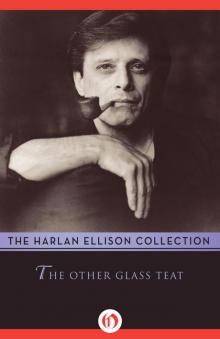 Other Glass Teat
Other Glass Teat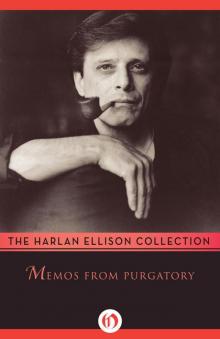 Memos From Purgatory
Memos From Purgatory I Have No Mouth and I Must Scream
I Have No Mouth and I Must Scream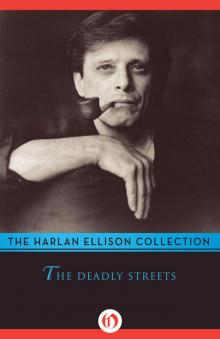 The Deadly Streets
The Deadly Streets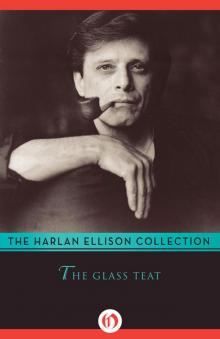 The Glass Teat
The Glass Teat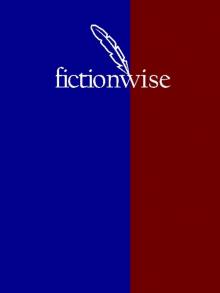 Paingod and Other Delusions
Paingod and Other Delusions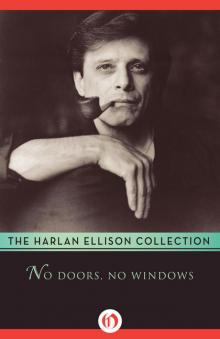 No Doors No Windows
No Doors No Windows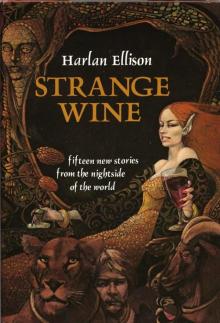 Strange Wine
Strange Wine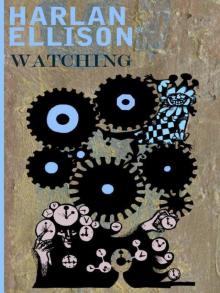 Harlan Ellison's Watching
Harlan Ellison's Watching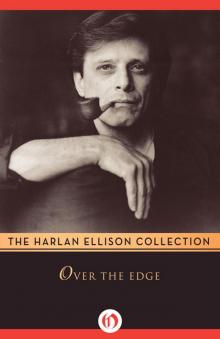 Over the Edge/An Edge in My Voice
Over the Edge/An Edge in My Voice Troublemakers: Stories by Harlan Ellison
Troublemakers: Stories by Harlan Ellison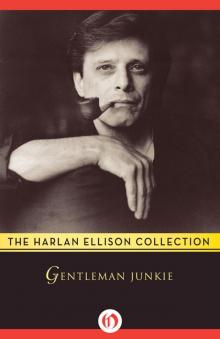 Gentleman Junkie and Other Stories of the Hung-Up Generation
Gentleman Junkie and Other Stories of the Hung-Up Generation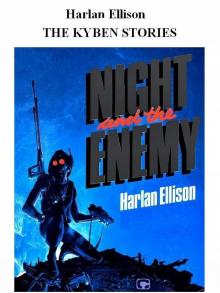 The Kyben Stories
The Kyben Stories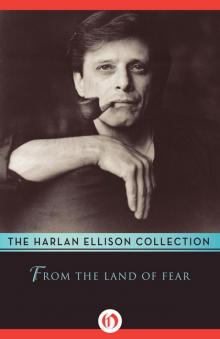 From the Land of Fear
From the Land of Fear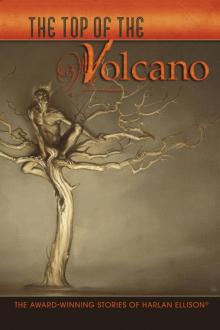 The Top of the Volcano: The Award-Winning Stories of Harlan Ellison
The Top of the Volcano: The Award-Winning Stories of Harlan Ellison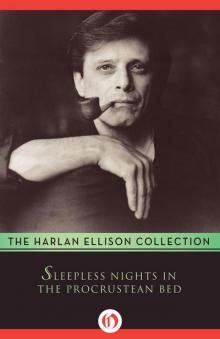 Sleepless Nights in the Procrustean Bed
Sleepless Nights in the Procrustean Bed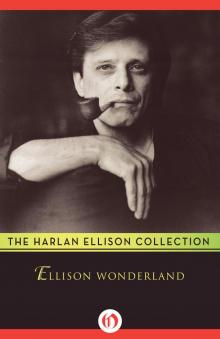 Ellison Wonderland
Ellison Wonderland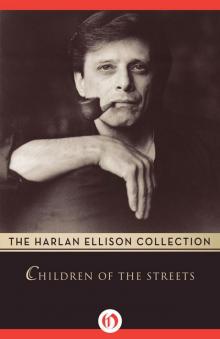 Children of the Streets
Children of the Streets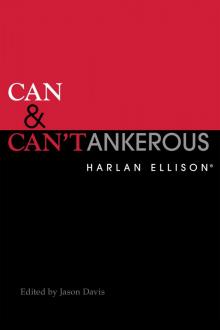 Can & Can'tankerous
Can & Can'tankerous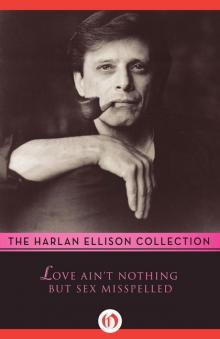 Love Ain't Nothing but Sex Misspelled
Love Ain't Nothing but Sex Misspelled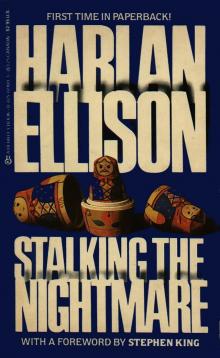 Stalking the Nightmare
Stalking the Nightmare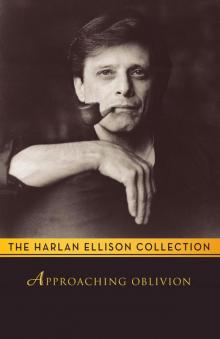 Approaching Oblivion
Approaching Oblivion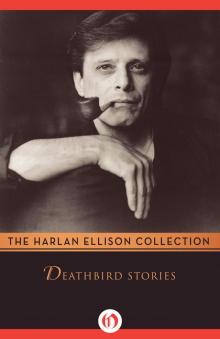 Deathbird Stories
Deathbird Stories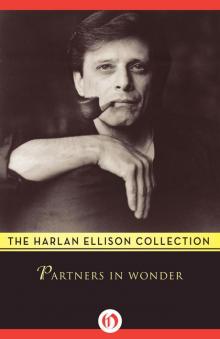 Partners in Wonder
Partners in Wonder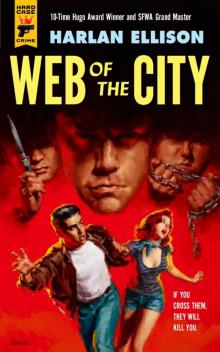 Web of the City
Web of the City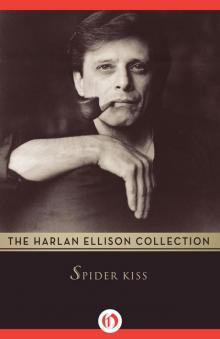 Spider Kiss
Spider Kiss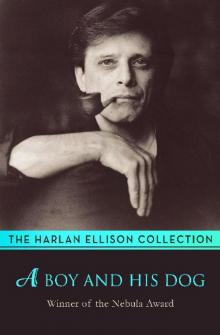 A Boy and His Dog
A Boy and His Dog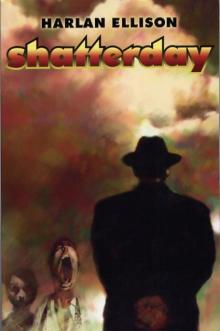 Shatterday
Shatterday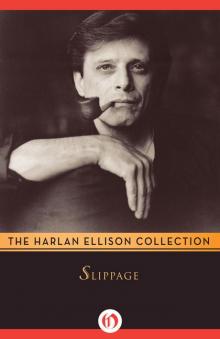 Slippage: Previously Uncollected, Precariously Poised Stories
Slippage: Previously Uncollected, Precariously Poised Stories Repent, Harlequin! Said the Ticktockman
Repent, Harlequin! Said the Ticktockman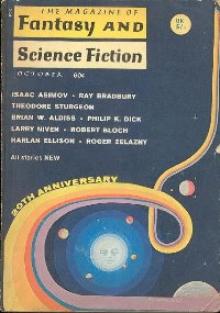 Come to Me Not in Winter's White
Come to Me Not in Winter's White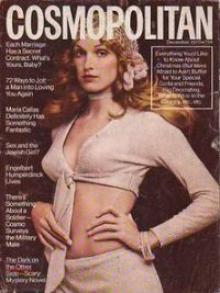 The Song the Zombie Sang
The Song the Zombie Sang The Other Glass Teat
The Other Glass Teat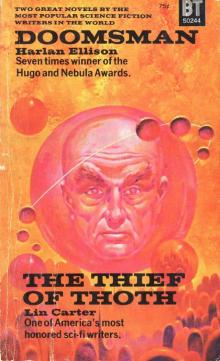 Doomsman - the Theif of Thoth
Doomsman - the Theif of Thoth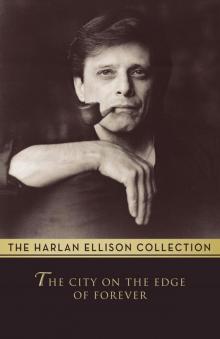 The City on the Edge of Forever
The City on the Edge of Forever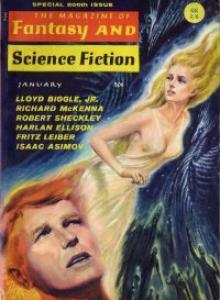 I See a Man Sitting on a Chair, and the Chair Is Biting His Leg
I See a Man Sitting on a Chair, and the Chair Is Biting His Leg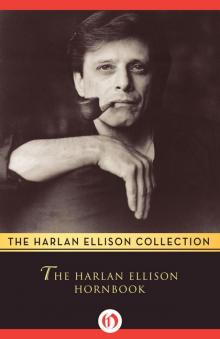 The Harlan Ellison Hornbook
The Harlan Ellison Hornbook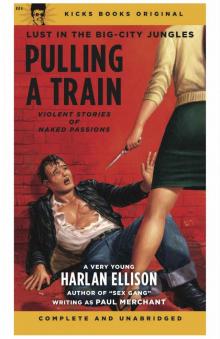 Pulling A Train
Pulling A Train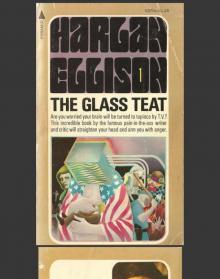 The Glass Teat - essays of opinion on the subject of television
The Glass Teat - essays of opinion on the subject of television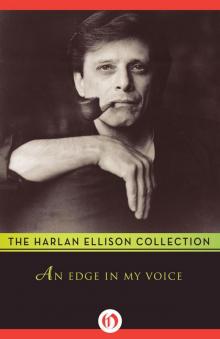 An Edge in My Voice
An Edge in My Voice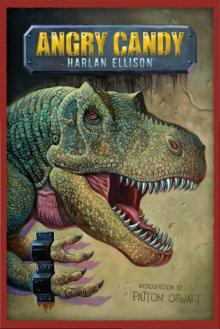 Angry Candy
Angry Candy Troublemakers
Troublemakers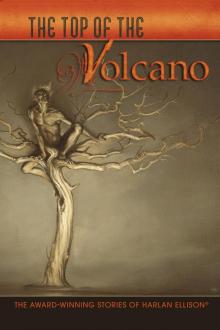 The Top of the Volcano
The Top of the Volcano Over the Edge
Over the Edge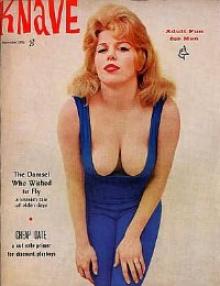 Survivor #1
Survivor #1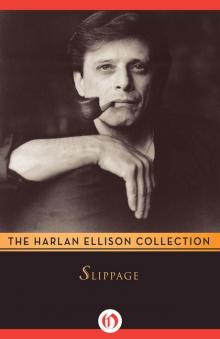 Slippage
Slippage